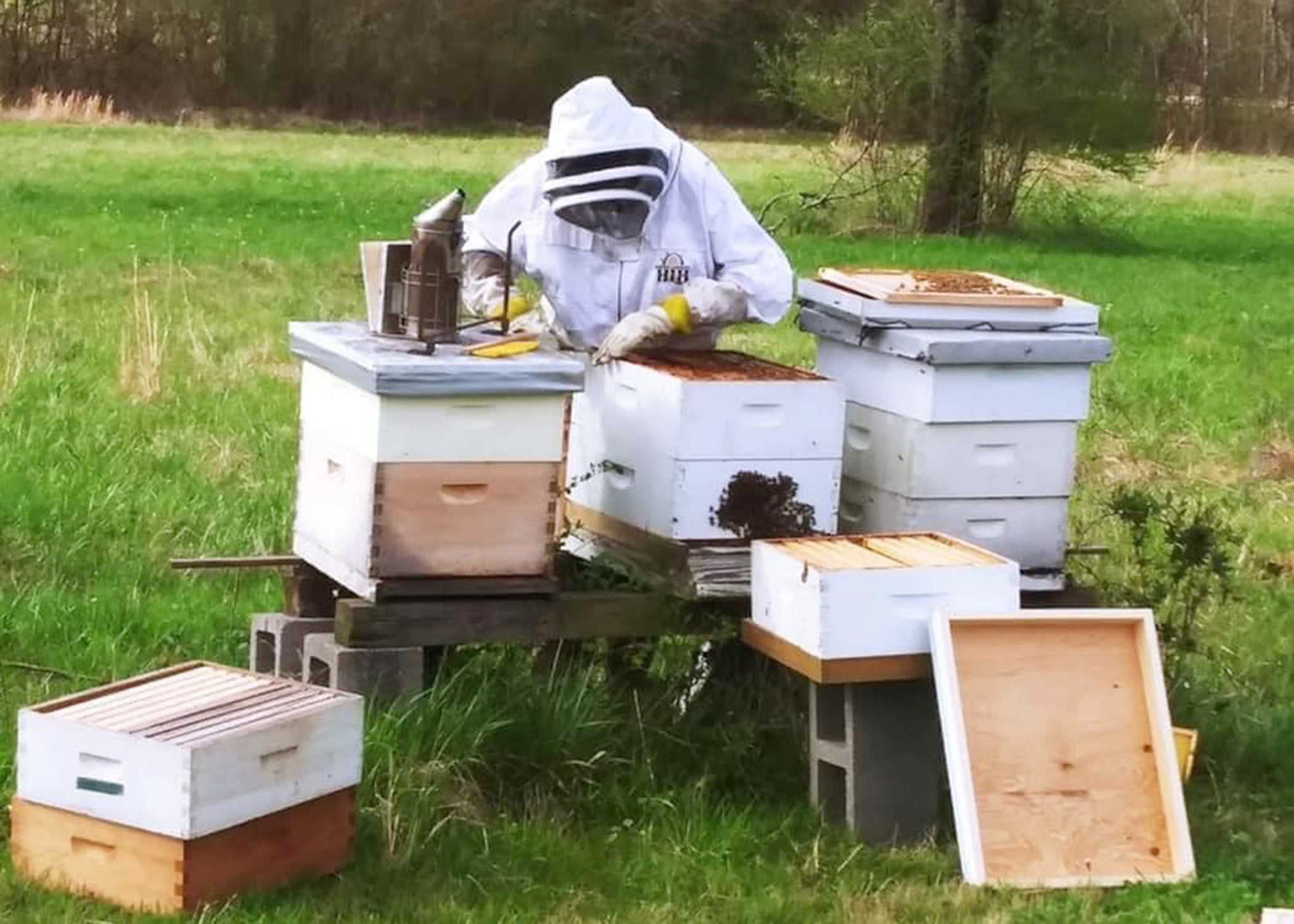Beekeeping requires planning, patience
Published 9:20 am Thursday, January 20, 2022

- CUTLINE: Beehives, like these that belong to Poorhouse Market in Starkville, are worked at least once every one to two weeks during the active, spring growing season, once a month during summer and winter, and again every one to two weeks in the autumn growing season. (Submitted photo/Poorhouse Market) Alt Text: A person works a bee hive.
By Susan Collins-Smith
MSU Extension Service
People interested in beekeeping should take time to answer some important questions and develop a plan before beginning this hobby.
One of the best ways people can learn about the hobby is to join a beekeeping group, said Jeff Harris, Mississippi State University Extension Service bee specialist.
“Local beekeeping clubs often have members with many years of beekeeping experience, and they are absolutely a great way for you to learn about the hobby before you begin,” Harris said.
“They give great advice about any of the major issues new beekeepers may face, invite knowledgeable speakers to their meetings and often offer hands-on demonstrations with live beehives,” he said. “Many people learn more by being immersed in the hive with a skilled beekeeper helping them than they would ever learn just by watching a lecture.”
Beekeeping can be done in cities and rural areas, but Harris recommends checking local ordinances and laws before beginning, no matter the location, because rules vary. Some places may limit the number of hives a person can have, and some states may have laws regarding hive registration.
The next step is to think about the everyday logistics of beekeeping, including where the hives will be kept and when the hives will be worked.
“Even if there are no laws restricting beekeeping, all new beekeepers need to consider where they want to keep their bees,” Harris said. “The most problematic issues can be with neighbors in urban and suburban settings who fear your bees. Honeybees can be safely kept in these areas, but careful consideration about how best to protect your neighbors, and therefore, future problems with you, should be a priority.”
Keep hives in an area that are shielded from view, such as behind trees or shrubbery. Make sure they are kept away from pets and high traffic areas, such as where children play. Confined pets are especially susceptible to a swarm of upset, stinging bees.
Place hives near ample food supply and easy access to water. Bees forage for food within one to two miles of the hive. The best locations provide several acres of a wide variety of floral sources rather than just a single flower type. In these locations, bees will be healthier, have enough food to store for winter and can produce higher honey yields.
Provide water sources close to the hive, such as shallow pools or dishes filled with pea gravel and water. Consider installing a drip irrigation line to keep the water sources filled.
“Bees are lazy. If they can get water from sources close to the hive, they are much less likely to venture to water features or swimming pools in your neighbor’s yard,” Harris said.
Buy gentle bee stock, and work bees during quiet periods when nearby neighbors are indoors and when pets and children are not rowdy.
“Honeybees can vary widely in their level of defensiveness, or their tendency to sting in response to a perceived threat,” Harris said. “There are very gentle stocks of bees, and there are grumpy and easy-to-rile stocks of bees. Word of mouth among beekeepers is a good way to find the gentlest bees.”
Labor is not a huge concern for hobbyists with only a few hives. Hives are worked at least once every one to two weeks during the active, spring growing season, once a month during summer and winter, and again every one to two weeks in the autumn growing season. A typical hive inspection takes 10 to 30 minutes.
Cost is another factor to consider. Start-up costs can run between $450 and $550. People should expect to spend between $300 and $400 to purchase all the woodenware that houses the hive. A starter bee colony with one queen and 10,000 worker bees costs about $150.
“The cost is substantial in the beginning, but the boxes can be used for seven to 10 years if they are painted, and beekeepers learn to propagate their own stock,” Harris said. “So, as beekeepers learn, the cost goes down.”
Michael Scheel, a member of the Southwest Mississippi Beekeepers Association who got into beekeeping as a hobby after finding his late father-in-law’s equipment, said beginners should expect a learning curve.
“I read and researched methodically, but I still struggled in the beginning,” said Scheel, who now has 70 hives and plans to expand to a total of 150 by the end of 2022 to supplement his income in retirement. “But I am very competitive and very inquisitive, and I decided I was going to learn to keep my bees alive. I had a lot of bees die in the beginning, and I spent a lot of money in a short amount of time replenishing my bees.”
Scheel said experienced beekeepers make up the most important learning resource.
“Google is a nightmare for a beginning beekeeper because there is so much information out there and no way to know what is right and what is wrong,” he said. “The best thing to do is find a club and a mentor, or someone who is willing to answer your questions and show you how to do things.
“Beekeeping is an art, and you’ve got to learn the skill set,” Scheel said. “It can be overwhelming for a beginner. But don’t get discouraged. You will have bees die, but that is part of learning.”
For more information about beekeeping for beginners, read Extension Publication 3594, “Beginning Beekeeping in Mississippi,” at https://bit.ly/3tLLQIi and visit the beekeeping page on the Extension website at https://bit.ly/3FcYGBw.





